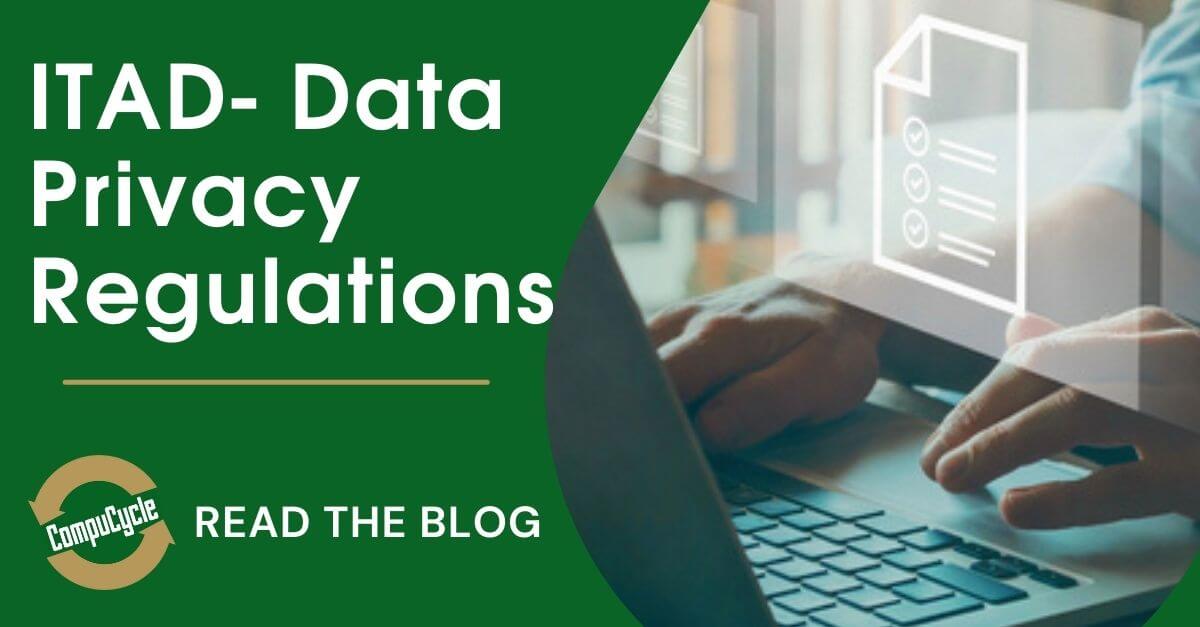
When computers first became available to consumers, data was an innocent word. Fast forward a few decades, and almost every household today has some kind of a computer. Data, too, has gone from an innocent word to one that holds immense weight.
Big data is now a market worth $202 billion. Many believe that regulatory bodies have been slow to rein in this huge industry. Change has been slow, but several high-profile breaches and cases of mishandling consumer data have accelerated this process.
As technology becomes increasingly sophisticated, governments and regulatory authorities demand corporations to step up their IT asset disposal efforts. This is because data breaches for both organizations and consumers have become more common.
ITAD regulations aim to ensure that consumer data is safe and secure. Compliance with these regulations is obviously mandatory for all businesses. As such, companies must be aware of all the relevant regulations that apply to them.

Here are a few ITAD regulations that affect most businesses in the world.
GDPR (General Data Protection Regulation)
The E.U. led the charge in reining in the criminally unregulated data market in May of 2018. Prior to the GDPR, there was no significant guidance on what companies could and couldn’t do with consumer data. There was also little incentive for big data companies and others to manage and protect consumer data properly.
The GDPR requires any company that collects the data of E.U. citizens to be fully compliant with GDPR. There are important penalties for non-compliance as well. A fine of 20,000,000 Euros or four percent of global revenues is enough to reveal how seriously E.U. regulators take consumer data safety.
Given that the U.K. has left the E.U., it is also important to discuss regulations for U.K. companies. U.K. regulatory bodies took the principles of the EU GDPR and passed the UK GDPR. An act that has almost all the same clauses as its E.U. counterpart, with the exception that U.K. regulators can make changes.
The E.U. and UK GDPR highlight the need for companies to have comprehensive ITAD policies that seek to prevent data breaches from old I.T. equipment.
Australia Privacy Act
While not as comprehensive as the GDPR, the Australian Privacy Act highlights that the Australian government is also anxious about the lack of regulation surrounding consumer data in Australia. Under the Act, companies are required to inform any consumer whose data has been the subject of a breach.
This Act aims to push organizations to maintain strong ITAD policies within their organization to be fully compliant with the law.
U.S. National Privacy or Data Security Laws
Though it may surprise many, the U.S. is still far behind the E.U. regarding an all-encompassing legal framework that protects consumer data. This does not imply that there are no regulations in place, only that there is no Act that guides companies and incentivizes them to maintain good ITAD policies.
There are industry-specific regulations, though. These are related to protecting the educational, health, and finances of individuals. These laws include:
- HIPAA, otherwise known as the Health Insurance Portability and Accountability Act. This law aims to secure the sensitive healthcare data of U.S. citizens.
- Educational records are protected under the FERPA, or Family Educational Rights and Privacy Act.
- Corporations that collect credit card data to process payments via the same are expected to follow the Payment Card Industry Data Security Standard.
- FACTA (Fair and Accurate Credit Transactions Act) & GLBA (Gramm-Leach-Bliley Act) aim to regulate financial data collected by financial institutions for various purposes.
Credit must be given to California for taking the lead in the U.S. and passing comprehensive legislation that is more in line with the E.U. and UK GDPR. The California Consumer Privacy Act, which went into effect in January 2021, ensures that individuals are informed about how each company collects and uses their data while also allowing them to remove it.
This Act has motivated other states to pursue similar legislation.
All these laws highlight the need for companies to build sound ITAD policies that reduce the risk of breaches and make an effort to reduce mishandling of consumer data. Many companies do not have the resources or time to manage compliance with all these regulations themselves, which is where services like CompuCycle come in to protect the brand identity of corporations. Reach out to us today and discover how we can help!
Recent Articles
Goodwill Houston Partners with CompuCycle to Offer Simple, Responsible Electronics Recycling for the Community
Goodwill Houston and CompuCycle have partnered to give Houstonians a simple, trustworthy way to donate and recycle household electronics.
Through this collaboration, residents can drop off laptops, desktops, tablets, monitors, and other household electronics at participating Goodwill Greater Houston donation centers. Reusable items help fund Goodwill’s job training and community programs, while non-resellable electronics are sent directly to CompuCycle’s certified Houston facility for secure, fully in-house recycling—ensuring materials are responsibly processed locally from start to finish.
CompuCycle Becomes Exclusive Woman-Owned E-Waste Processor in Texas with ISO 27001 Data Security Certification
New Information Security Management System (ISMS) Certification Guarantees End-to-End Data Confidentiality and Integrity for Corporate IT Asset Disposition (ITAD). HOUSTON, TX – December 9, 2025 – CompuCycle, an industry leader in secure and sustainable IT…
Secure Electronics Disposal in Houston: Why the City’s Largest Industries Trust CompuCycle
When a major healthcare system decommissions thousands of laptops, or an oil and gas company retires an entire data center, one question comes up again and again: What happens to all that data — and…
CompuCycle Executives Join R2 TAC and e-Stewards Leadership Council to Advance ITAD Standards
Houston-based ITAD provider deepens its industry influence through active participation in standard-setting committees. As corporate ITAD needs evolve alongside stricter compliance and ESG requirements, CompuCycle continues to lead the way—this time by contributing directly to…




